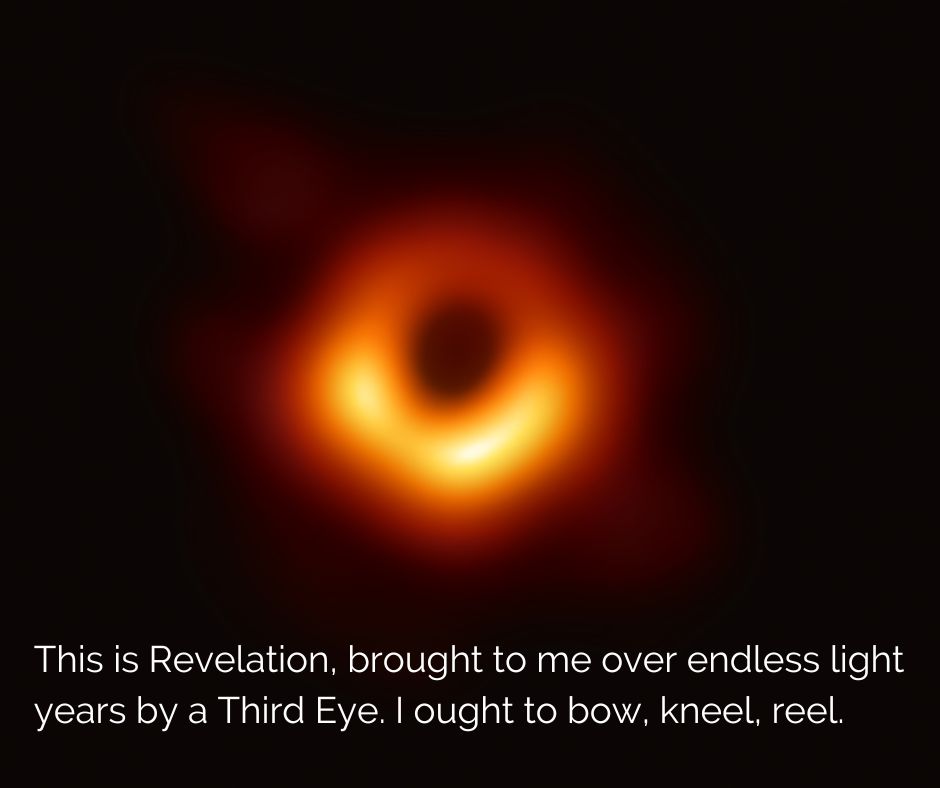The Bible and The Black Hole

There was an old saying, that people of faith should seek to understand their world with “the Bible in one hand, and the newspaper in the other.” For the last hundred years it’s been increasingly difficult to interpret the Bible, and now nobody trusts a newspaper. Maybe just as well.
The idea that we could ever grasp the world and know the Maker’s mind by reading a text, or two texts, one in each hand, was never quite right. Even the best book on water is no substitute for wading in a tidal pool at sunrise. Yet that’s what has happened to our faith traditions. They have gradually become academic, intellectual, textual. They have created a set of questions for which they already have the answer. Think: catechism, systematic theology. They have moved us out of nature and into officially “sacred” spaces. They have taught us to doubt our direct experiences of God, of life, of one another.
A few days ago NASA released a stunning photograph of a black hole’s shadow. A black hole, by definition, is invisible, but with x-ray telescopes positioned all over the globe, they were able to glimpse its dark umbra. It is 55 million light years away, and 6.5 billion times the mass of the sun. I saw this staggering, spectacular image and thought, This is divine Revelation, brought to me over endless light years by a Third Eye. I ought to bow, kneel, reel.
This is how we understand our world, our lives. By looking at what is right in front of us, paying attention to rivers and rocks, foxes and ospreys, white oaks and black holes, allowing ourselves to be slain by unmanageable beauty at fearful scale. Many people no longer wish for a faith that answers all their questions. We want a faith that, in the face of black holes, has, blessedly, nothing to say. We want to turn aside, like Moses at the burning bush, take off our shoes and gaze. Let that be good enough, without anyone having to decide, officially, what it means. Faith used to mean precisely not knowing but trusting anyway, until we turned it into a grab bar of certainty. What if we could just say, We don’t know—don’t need to know. All we can do is pay attention, turn aside, and be amazed.
I’m going for a hike with a friend and I’m going to be amazed!
Sally
That’s it, sister!
Love taking dogs to Woodland Park in Darien (often see Ryan and his dog Beckett) – every time we go it’s like it’s the first time they’ve ever been, they go nuts! Lord help me to see the world through Wilbur’s (the pug’s) eyes!
I was speaking to a woman this morning—she was lapsed Roman Catholic, and telling me how painful the Easter mass was for her this year. Just nothing that fed her soul—to say nothing, she said, of the way women, and gays and lesbians are treated in the church. But she pointed to our deck and said, “But who can stand there and see creation all around us and not feel in touch with God?” That’s where people find God most frequently and reliably. And our beliefs and theologies have to take that into account. Right now—our sense of Creation as the Body of Christ, the Incarnate One, is either just a lovely childish thought, or a case of hideous pantheism.
Bravo, David. My analytical mind always wants to explain/make sense/find meaning. Sometimes, when walking on the beach or looking at an egret or hiking up a mountain, I’m able to let go. Now, I want to try to do it more often – maybe even all the time!
Thanks, Blake, for that insight. As someone who’s admired your nature photography, I know you know how to pay attention—deeply.
Ironically, our creeds and scripture come out of a profound experience of the Spirit -either group or individual. They were the best way the people who had the experience could hand it down to the future generations – not to replace experience, but to encourage engaging in it…Thanks, David!